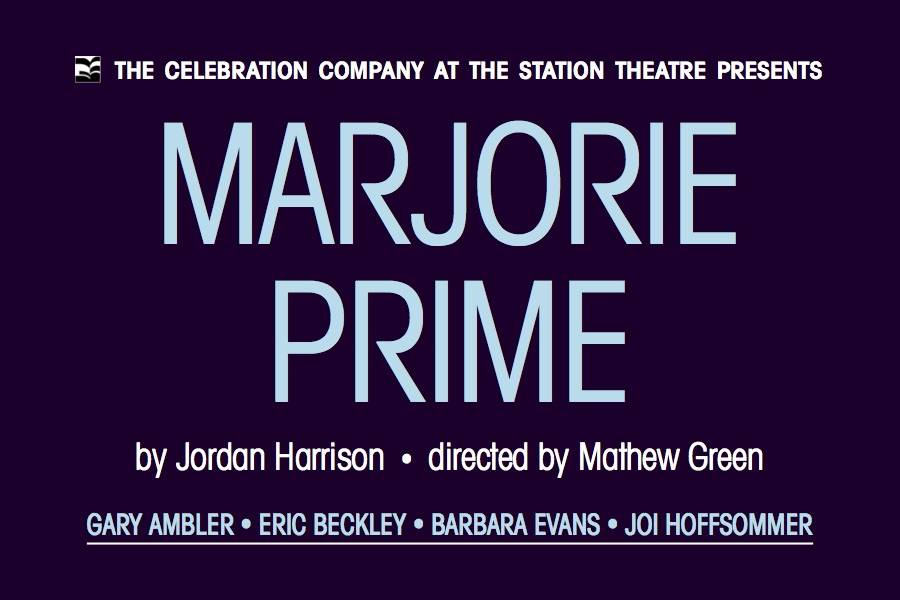Marjorie Prime, written by Jordan Harrison and directed for the Station by Mathew Green, is a near-future play where technology has gone just a little farther than today. In the show, Tess is caring for her elderly mother, and Tess’ husband Jon advocates for the use of an artificial intelligence companion called a “Prime”. Primes are designed to help a particular person, in this case Marjorie, record and retain their memories, often taking the form of someone close to the subject.
The director and I got to talking about it, and our conversation went something like this.
The following interview has been condensed and edited for clarity.
But first, a word from our sponsor. Please enjoy this trailer for the film, made by Protagonist Pizza Productions:
Smile Politely: When researching this play, I noticed that it has been made into a film with an all-star cast, which is showing at festivals but hasn’t been widely released. Was the intent to stage the production before the film comes to town?
 Mathew Green: That was a stroke of luck, because I didn’t really know about the film until I sunk my teeth into the play. The play has its own pedigree: it was a finalist for Pulitzer, the playwright is a staff writer on Orange is the New Black.
Mathew Green: That was a stroke of luck, because I didn’t really know about the film until I sunk my teeth into the play. The play has its own pedigree: it was a finalist for Pulitzer, the playwright is a staff writer on Orange is the New Black.
For me to read a play and understand before I’ve finished it that this a story I need to tell other people, that’s a crucial element for me.
I think audiences are going to connect with these actors immediately.
SP: Joi Hofsommer, Barbara Evans, Gary Ambler, Eric Beckley, it’s like our own all-star cast. We all love these actors already.
Green: Yeah, but the reason that we do is because there’s something very genuine about who they are on stage. And they’re playing very real, very relatable people. Certain kinds of plays don’t call for that – this one does.
This one needs to be looking into the window of the next house over. While this takes place in the future, these are not the Jetsons. No, we don’t have flying cars, but we do have tiny superpowered computers which fit into our pockets and are our best friends.
SP: And a portal to all accumulated human knowledge.
Green: Exactly, the sum total of human knowledge is in our hands at all times, even if we predominantly use it to play a game or send each other pictures.
I have questions about how much people relate with each other as opposed to interacting with a device.
SP: Exactly, needing that medium, that intermediary. Like the robot.
Green: Not a robot.
SP: Memory device?
Green: He’s A.I.
SP: Of course. I’ll clean it up in post. What’s his name?
Green: Walter.
SP: So in that vein, without spoiling anything, the idea of Walter is that he helps her remember things now, but he also records what she says?
Green: Through conversations with her and other members of the family, Walter becomes sort of a living document who can be called upon to answer questions or simply pass the time. Other members of the family can talk to him and add to or elaborate upon these, in case Marjorie’s memory is shaky.
The thing about a Prime is, if you give it the wrong information, and that information replaces the truth, and you don’t remember what the truth is, then what’s the truth?
SP: Hmmm. That’s a pretty deep question. And it’s a “living room play”.
Green: Yes.
SP: Is there yelling?
Green: [laughter] No, it’s not a yelling play. Without scaring off people who really enjoy yelling, I will say that there is very little, even in the vein of raised voices.
SP: I’m sure it’s still highly emotional, because of the concept.
Green: It is. It’s an emotional play about memory, it’s a play about grief, it’s a play about dealing with loss and long-held tension between mother and daughter.
Two big trends on Broadway seem to be plays about aging and plays about technology – either the fear of technology or the value of life in an increasingly technological world. And this play combines both of those things. What you’re getting is the application of a slightly-futuristic technology onto what is otherwise a completely ordinary life, and seeing what transpires.
Sometimes that’s the more impactful thing – when you’re seeing the impact on someone who could be you.
SP: And you got Barb Evans out of retirement to do that.
Green: Barb reached out to me, because she saw a role that she thought she could attack with a lot of integrity. I did not disagree. I was quite flattered, and it’s always nice when people whose thinking you respect are thinking along the same lines you are. Because, of course I had thought of her for it, and before I even had a chance to ask, she asked me.
I like to reach out to people when I can. I spoke to a few people, and I was trying to get just the right combination of actors. I frequently tried to reach out to actors whose work I’ve seen but who I haven’t had the chance to work with yet — Eric [Beckley], for instance. And then Gary said he might be into it. And then Joi. And when this group of people are interested in what you’re doing, you put your pencil down because you have the right answer. It’s Director Christmas.
SP: And so how’s it going with these all-stars?
Green: It makes it easy that I have actors who are extremely experienced and have wonderful instincts and know how to work a scene and know how to tell a story so it’s like –
My job isn’t to create the painting, my job is to figure out the best way to hang it so people can see it and appreciate it. That’s what I’m doing, it’s mostly watching good actors work out a scene and trying to find the most honest way to do it. I’m just cherry-picking the best moments.
SP: And you’re excited about hanging this picture.
Green: It’s always exciting to hang a picture but more exciting to have people see it.
SP: What are you most excited about having people see inside this picture that you’re hanging?
Green: Theatre is an incredibly powerful medium, because it has always been intended to be both a recording of life and a reflection of life.
Performance is important but storytelling is key.
Setting aside the futuristic aspect of the Prime. Storytelling is the most important aspect of theatre, and it is also the most important aspect of this play. Because our memories become our history, and history is looked back upon as if it’s actually fact by later generations, and the scope of that can be a greater scope than just a family.
SP: Where do you think your production of Marjorie Prime fits into the larger scope of C-U’s artistic culture right now?
Green: For one thing, it’s definitely a showcase for some of the best actors in town. And that is important. This summer, in the Station especially, there’s been a great big spotlight shown on the young actors. I think this is an opportunity to see some of the elder statespeople. The generation that came before me have done so damn much.
One of the important goals of the Station is to represent and reflect back its community. One of the demographics of our diverse community is the older population, as well as the middle-aged citizenry which is taking care of that older population.
This is a play about parents and children, it’s a play about adults facing the end of their lives, and it’s about how we deal with those types of baggage in a world that feels like it’s getting less interpersonal.
—
To unplug and pause from the screentime, and connect to the folks around you, consider seeing Marjorie Prime at the Station Theatre in Urbana (223 N. Broadway Ave.) between July 27th and August 12th. Shows begin at 8 p.m., and tickets cost $10 on weeknights or $15 on weekends. See the complete details on their website, where you can also make a reservation, or by calling the ticket office at 217-384-4000.








